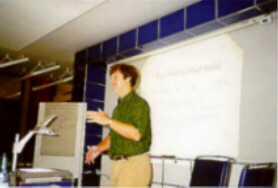
|
The two lectures of the 1st IZA summer school were held by Francis Kramarz (CREST/INSEE, Paris) on the "Analysis of Labor Markets Using Matched Employer-Employee Data", and Frank Windmeijer (Institute for Fiscal Studies, IFS, London) on the "Evaluation of Job Training Programs".
In his six lectures, Prof. Kramarz gave an extensive introduction into the specific estimation techniques and problems connected with the use of matched employer-employee data. First, Prof. Kramarz presented a basic econometric model in which some measured outcome for an individual is a function of time-varying exogenous characteristics of the individual, a pure person effect, a pure firm effect, and a statistical residual. Prof. Kramarz then used this basic econometric model to present a whole range of questions within labor economics which can be stressed using matched employer-employee data, i.e. the relative importance of person and firm variables in the determination of compensation, the relative importance of individual mobility in relation to firm-specific employment adjustments, unemployment insurance, and other aspects of the labor market. For instance, using a matched employer-employee data from France he showed, that person effects explain about 90 % of inter-industry wage differentials and about 75 % of the firm-size wage effect, while firm effects explain relatively little of either differential. In the final part of his lecture, Prof. Kramarz described a broad list of existing employer-employee datasets and discussed with the students further research questions which could be answered with these datasets.
|